Hunt for the real Tailor of Gloucester's descendants
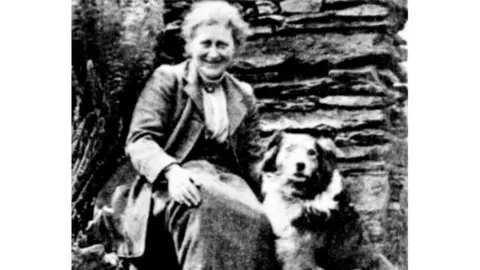 PA Media
PA MediaPublished 120 years ago, the Tailor of Gloucester story was based on a real incident involving a tailor commissioned to make a suit for the new mayor of the city.
John Samuel Prichard, who inspired the famous Beatrix Potter character, supposedly returned to his shop on a Monday morning to find the suit mysteriously completed except for one buttonhole, with a note saying: "No more twist!"
'Twist' referred to the silk thread with which to stitch the last button.
Prichard's assistants had finished the coat over the weekend, but the tailor encouraged a tale that fairies had done the work and the incident became the stuff of local legend.
Now a search has been launched to find descendants of the man who lived from 1877-1934.
The appeal is being made by the House of the Tailor of Gloucester, a tourist attraction shop at 9 College Court, Gloucester, which pays homage to the famous children's author, artist, conservationist and award-winning sheep farmer.
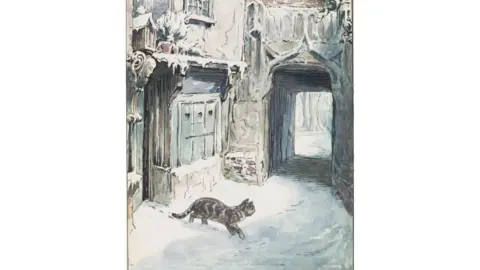 New York Public Library
New York Public LibraryJohn Prichard died in 1934 and is buried in the churchyard of St Mary in Charlton Kings, Cheltenham.
Volunteer director of the House of the Tailor of Gloucester, Paul James said: "He had four children we believe.
"We have been working with the chair of Charlton Kings local history society but we haven't been able to identify any relatives yet.
"It is one of the most famous stories about the city. But, perhaps the original person doesn't have the profile that he should do.
"The story of that life we would love to bring to light."
It is hoped any relatives who are found will attend a special evensong service at Gloucester Cathedral on Wednesday, 11 October at 17:30 BST, and the clock is now ticking for the museum to trace the tailor's family in time.
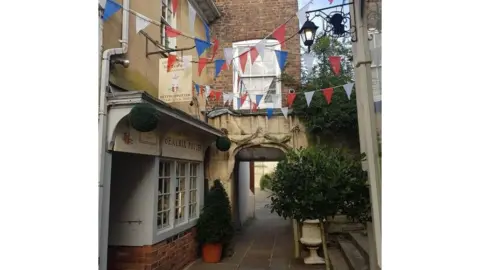 House of the Tailor of Gloucester
House of the Tailor of GloucesterThe shop and museum is based in the building which the author sketched as the tailor's shop to illustrate the book.
John Samuel Prichard's shop was actually at 45 Westgate Street but Potter preferred the look of 9 College Court, a timbered building a short distance away, steeped in the shadow of Gloucester Cathedral.
The original building at College Court can be traced back to 1535.
The most recent owner of the building was the Frederick Warne Publishing Co. Ltd, the very same company that published Beatrix Potter's original story 120 years ago.
But, having been closed in 2005, it was reopened as a museum in 2007, after a group of local people banded together to buy the building.
The House of the Tailor of Gloucester now relies on volunteers to operate but attracts tourists from across the world.
Mr James added: "We have been working with the council on the Cathedral Quarter project, which is helping to restore some of the historic buildings in that area.
"We are also looking for any descendants of the Hutton family.
"They were the owners of Harescombe Grange outside Gloucester on the way to Stroud, where Beatrix Potter stayed."
Helen Beatrix Potter
Helen Beatrix Potter was born in West Brompton, London in 1866 to an upper-middle-class household. Beatrix Potter had many pets but was home-schooled and grew up isolated from other children.
Her family spent many summers in Scotland and the Lake District, where she developed a love for landscapes, animals and the natural world.
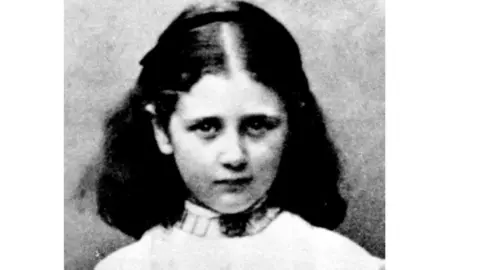 PA Media
PA MediaThese elements of her childhood would go on to become the major motifs in her more than 60 published works, especially her 23 children's stories, which have sold more than 250 million copies worldwide.
An accomplished illustrator, Beatrix Potter self-published the Tale of Peter Rabbit in 1902 with her own original drawings.
The book was an immediate success, and in 1903 Peter Rabbit was the first fictional character to be made into a patented stuffed toy, making him the oldest licensed character.
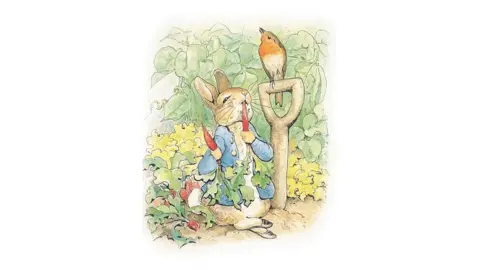 Penguin
PenguinPotter used the proceeds from her books to buy up vast swathes of farmland in the Lake District, and was instrumental in protecting the natural landscape from development.
In 1894, Potter stayed with her cousin, Caroline Hutton, at Harescombe Grange. It was on this trip that she heard about the legend of John Prichard.
In Beatrix Potter's version of the tailor's story, he is commissioned to make a waistcoat for the mayor in which he is to get married on Christmas Day.
Unbeknownst to him, the coat is then finished off by the grateful mice whom the tailor saved from his preying cat.
The tale is characteristic of Potter's cheery style of writing, light-heartedly personifying the mischievousness of her animal characters.
Whilst the story was not officially published until 1903, Beatrix Potter wrote the story in 1901 for one of her tutors' daughters, Freda Moore.

Follow BBC West on Facebook, Twitter and Instagram. Send your story ideas to: [email protected]
